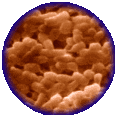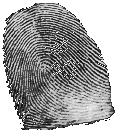|
In this section: Chance
or Design? • The Scientific Method •
Life in a Test Tube? • The
Eye • Irreducible Complexity •
Anything Can Happen? •
Evolution or Selection? • Real Examples of
Evolution • "Do You Feel Lucky?" •
(Abio)Genesis 1:1 • Life
from Comets? • Life on Mars? •
Richard Dawkins • A Brief
History of Slime...
Natural adaptations or Intelligent Design?
When is it evolution and
when is it just selection?
We're told that life is evolving all the time. Drug-resistant
strains of bacteria "evolve" to make the fight against disease more difficult.
Is this evolution or just selection?
|
 |
 |
Everyone has a different finger print, but nobody would argue that
this represents evolution. It's a naturally occurring
variation, yet a surefire way to identify intruders. Our immune
system controls foreign substances by making an
antibody with a molecular arrangement that fits the shape of
molecules on the surface of the intruding substance.
The key question is this:
Do new viruses really represent
evolution, or
is it just the same basic organism with a "fingerprint" we have yet to
encounter? In a billion years will its descendents have become a new
intelligent life form or will they still just be viruses?
|
Suppose a disease has two strains, most of which was curable,
but a small portion of which was resistant to drugs.
Each decade, the drugs knock out half the incidences of the curable
disease:
Did the curable bacteria
"evolve" or did the resistant one just become more
prevalent?
 |
When this same thing happens with dogs, it's called breeding. No new species has
evolved because no new information has been created. We've just sifted existing
information into different gene pools. Put them all back together and you'll
soon have a population of happy mutts again. |
 |
Variation is not necessarily evolution!
Natural selection and adaptation does in fact occur when the environment
changes in a way that favors specific characteristics.
The real question, however, is whether these characteristics represent
new information or whether they were already programmed into the DNA of various organisms
so the species can adapt to changing environments.
 A classic example of selection said to explain
adaptation and evolution is the peppered moth in England. Back in 1850, the trees
where the peppered moths lived were mostly white because of the white lichen that grew on
them. The birds found the black peppered moths on the white trees to be easy prey
and ate them, so 98% of the peppered moths in the area were white. Later
industrialization and pollution killed the lichen, revealing the trees' black bark. The
birds now found the white peppered moths easy prey and ate them instead, so 98% of the
peppered moths were black by 1950. A classic example of selection said to explain
adaptation and evolution is the peppered moth in England. Back in 1850, the trees
where the peppered moths lived were mostly white because of the white lichen that grew on
them. The birds found the black peppered moths on the white trees to be easy prey
and ate them, so 98% of the peppered moths in the area were white. Later
industrialization and pollution killed the lichen, revealing the trees' black bark. The
birds now found the white peppered moths easy prey and ate them instead, so 98% of the
peppered moths were black by 1950.
The trouble is that this demonstrates selection but certainly not
evolution, as both light and dark moths existed before and after industrialization and no
new information was created in the DNA.
Evolution, as an explanation for new species or life itself, must mean
that new and unique information is added to the DNA to create new features and
functions: eyes for sight, thumbs for grasp, wings for flight.
Have you ever observed a hint of even the simplest of new features to come about by
natural processes?
If evolution does occur . . .
could it have occurred without direction?
|

